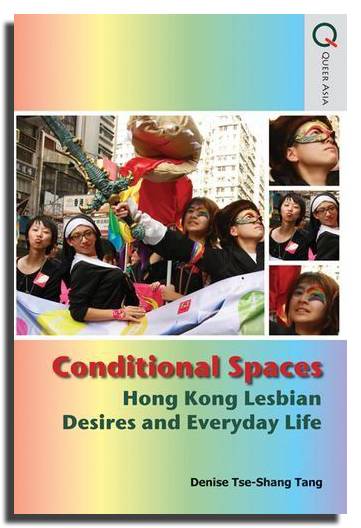Conditional Spaces
Hong Kong Lesbian Desires and Everyday Life
Denise Tse-Shang Tang

Against this background, Denise Tang’s Conditional Spaces is a groundbreaking and inspiring study of the social and spatial production of lesbian identity and same-sex relationships. The book examines a wide range of coping strategies by presenting life histories of 28 Hong Kong transgender lesbians and women with lesbian desires, aged from 15 to 51. In the book’s four main chapters, organized around intersecting spatial dimensions, Tang does an excellent job of mapping the oppressive and resistant factors that shape lesbian lives in Hong Kong.
In Chapter 2, she addresses the “congested spatiality” of home and family. Personal privacy and same-sex intimacies are difficult to negotiate, and risky hiding strategies are critical in order to establish a sense of personal integrity, but Tang rightly rejects a view of living spaces as categorically oppressive, and focuses instead on her informants’ everyday negotiations and resistance despite powerful structural sociospatial limitations. She chronicles the risks and emotional costs of such living conditions, including parents invading personal privacy and policing gendered conformity. Self-blame, depression and anxiety are common experiences.
At the same time, Tang shows the importance placed by many of her informants on achieving independence and the ability to move out, through educational achievement, marriage and even running away. The congested spatiality of family life and housing in Hong Kong encourages many non-conforming people to seek out alternative spaces in the dense cityscape, such as hallways, shopping malls and urban corners, to experience intimacy and community. Chapter 3 focuses on consumption spaces as temporary sites of lesbian resistance, located mainly in or around the “lesbian hub” of downtown Tung Lo Wan (Causeway Bay).
Due to extortionate property prices and women’s lower spending power, any permanent, exclusive lesbian space is impossible. Instead, public leisure and spaces of consumption are temporarily converted into semi-private venues that provide comfort and a sense of community. Gay male bars often function as entry points, and lesbian spaces remain contested and in flux, limited by spatial density, commercial focus and mainstream social stigma. This stigma, in turn, is upheld by central regulatory spaces, including secondary schools, religious institutions and the workplace, which are discussed in detail in this chapter. Tang presents powerful personal narratives of the strategic and intersecting spatial practices which women use to cope when encountering bullying at school, or being outed by co-workers and rebuked by Protestant or Catholic congregations.
In Chapter 4, on political spaces, Tang argues for the importance of coalition-building and a multi-directional focus across different marginalized groups, based on issues such as human rights and protesting against conservative Christian rhetoric, and shows how a “step-by-step model with a long-term vision” (p. 111) has emerged as desirable for Hong Kong queer groups. Throughout all chapters, Tang argues for an everyday politics of social and spatial negotiation of scarce space and resources, and the specific challenges that women with same-sex desires face in Hong Kong.
A final chapter on the cultural politics of queer film festivals provides a particularly rich and engaging discussion on the complex intersections of conservative Christian norms and globally circulating ideologies of material consumption in Hong Kong after the 1997 handover. Tang argues that the uncertainty of the post-1997 situation, in which the authorities failed to provide anti-discrimination legislation and address the rise of Christian conservatism, provided a political urgency within the larger society to address democratic ideals and organize for rights and visibility.
The Hong Kong Lesbian and Gay Film Festival, of which Tang was director for two years, provided a platform to address queer concerns of rights and visibility, despite the festival’s simultaneous “buying into” a more mainstream middle-class and gay male consumerist logic. Conditional Spaces adds to a small but rapidly growing sub-field of queer China studies in the humanities and social sciences, providing original perspectives based on firsthand participatory research, usually by authors who themselves identify with queer communities and who, like Tang, share the cultural background of the region. Hong Kong University Press’ Queer Asia Series has been central in promoting the publishing and visibility of this research, and Tang’s book is a most welcome addition to this list.
This is original research, innovative thinking and engaging writing by an activist researcher keen to disseminate her work to a larger audience. Tang’s writing style is personal and commands considerable knowledge of the relevant literature, both English and Chinese. Conditional Spaces contributes important analytical and ethnographic perspectives to gender and feminist studies, China and Asian studies, sociology and queer geography. The vivid and refreshingly jargon-free language throughout makes it an excellent read for undergraduate students, professors and activists alike. ~ Elisabeth L. Engebretsen, Helsinki Collegium for Advanced Studies . The China Journal , No. 70 (July 2013), pp. 236-237
Check for it on:
Details
| ISBN | 9789888083015 |
| Genre | LGBT Studies/Social Sciences |
| Publication Date | 01-Aug-11 |
| Publisher | University of Washington Press |
| Format | Hardcover |
| No. of Pages | 192 |
| Language | English |
| Rating | Great |
| Subject | History / Asia / India & South Asia; Social Science / Gay Studies; Social Science / Gender Studies; Social Science / Lesbian Studies |
| BookID | 2350 |

